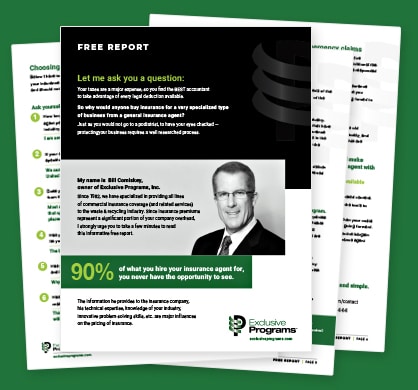In the world of waste management, where efficiency, reliability, and environmental responsibility intersect, your fleet of vehicles is the underdog hero of your company. These workhorses tirelessly navigate the streets, collecting, recycling, and disposing of waste, ensuring the cleanliness and sustainability of our communities. But with every twist and turn, they face a barrage of risks and challenges that could disrupt their mission. Without sanitation vehicle fleet insurance, you flirt with financial and operational disasters.
Imagine a world where your fleet operates with legendary protection, where challenges are met with unwavering resilience, and where your commitment to excellence is mirrored in every vehicle on the road. That’s where Exclusive Programs steps in, turning your ordinary waste management fleet into something truly extraordinary. In this blog post, we’ll delve into the world of fleet coverage for waste management, shedding light on the significance of comprehensive coverage offered by Exclusive Programs.
Understanding Sanitation Vehicle Fleet Insurance

This is where sanitation vehicle fleet insurance comes into play. It offers protection against a wide range of risks and uncertainties that sanitation vehicle fleets may face. This includes accidents, damage, theft, liability claims, etc. With the right insurance coverage, you can ensure that your fleet remains operational, even in the face of unexpected challenges.
Fleet Coverage for Waste Management: A Closer Look
Sanitation vehicle fleets often consist of various types of vehicles, including garbage trucks, recycling trucks, and waste transport vehicles. Each of these vehicles serves a unique purpose in the waste management process. Fleet coverage for waste management provides a comprehensive insurance solution that takes into account the specific needs of each vehicle type.
Most Fleet Coverage for Waste Management Includes:
- Property Insurance: This coverage protects your equipment and facilities, including waste compactors, sorting machines, and recycling facilities, from damage caused by accidents, natural disasters, or other unforeseen events.
- Liability Insurance: Liability coverage is essential to protect your business from legal claims and lawsuits in case of accidents or injuries involving your sanitation vehicles.
- Commercial Auto Insurance: This component of fleet coverage ensures that your vehicles and drivers are adequately protected, covering damages and injuries in the event of accidents.
- Workers’ Compensation: This coverage provides financial support to employees who may be injured on the job, helping to cover medical expenses and lost wages.
- Environmental Liability Insurance: Given the environmental impact of waste management, this coverage is crucial to protect your business in case of environmental contamination incidents.
Why Sanitation Vehicle Fleet Insurance Matters
For waste management businesses in Florida, sanitation vehicle fleet insurance is not just an option—it’s a necessity. Here’s why:
1. Protection of Valuable Assets
Your sanitation vehicles are significant investments. Sanitation vehicle fleet insurance ensures that these assets are protected against damage, theft, and other unforeseen events, minimizing financial losses and downtime.
2. Liability Coverage
Accidents can happen, and when they do, liability claims can be financially devastating. Fleet insurance includes liability coverage to shield your business from the legal and financial consequences of accidents involving your vehicles.
3. Operational Continuity
Downtime in waste management operations can have a ripple effect, leading to missed collections, delayed services, and dissatisfied customers. With the right insurance, you can quickly get your fleet back on the road, minimizing disruptions.
4. Compliance with Regulations
The waste management industry is subject to various regulations and environmental standards. Sanitation vehicle fleet insurance can help you stay compliant with these regulations, avoiding fines and penalties.
Exclusive Programs: Your Partner in Sanitation Insurance Solutions
At Exclusive Programs, we understand the unique challenges faced by the waste management industry in Florida. Our specialized programs, such as WasteGuard and WasteComp, are designed to streamline waste management operations, improve efficiency, and enhance safety. We offer customized sanitation vehicle fleet insurance solutions that cater to the specific needs of your business.
As industry leaders, our goal is to provide sustainable and cost-effective waste management solutions while educating businesses about the importance of waste management and preservation. We invite you to explore our services and discover how Exclusive Programs can help protect your sanitation vehicle fleet. Together, we will optimize your waste management processes.
Don’t Wait – Get Coverage Today
Protecting your sanitation vehicle fleet is paramount to ensuring operational continuity and minimizing risks. Sanitation vehicle fleet insurance, with its comprehensive coverage and fleet solutions tailored to waste management needs, is the key to safeguarding your assets and maintaining a smooth operation.
To learn more about how Exclusive Programs can assist you in securing your fleet and enhancing your waste management processes, contact us for more information on our specialized sanitation insurance solutions in Florida. Don’t leave the safety and efficiency of your waste management business to chance. Trust the experts at Exclusive Programs to provide the coverage and expertise you need.



